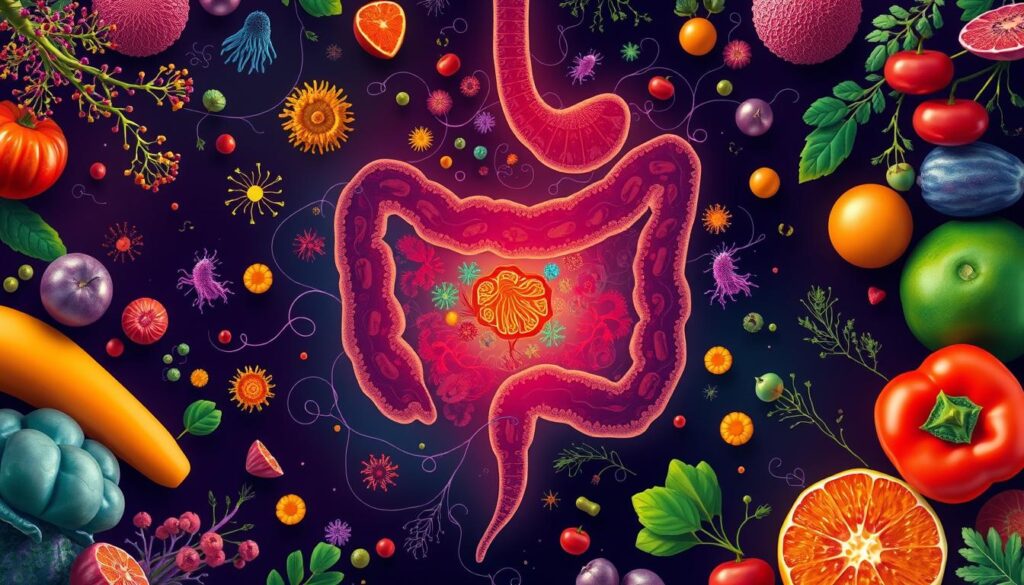Weight loss in your 40s can be tough because your body changes a lot. But, with the right plan, you can lose weight and stay healthy. This guide will give you expert tips to help you lose weight in your 40s.
Key Takeaways
- Understand the metabolic shifts that occur after age 40 and how to adapt your approach accordingly.
- Discover the role of protein, fiber, and smart portion control in effective weight management.
- Learn how to leverage strategic meal timing and exercise to boost your metabolism.
- Recognize the importance of stress management and quality sleep for sustainable weight loss.
- Explore the connection between gut health and weight regulation for a holistic solution.
Understanding Metabolic Changes After 40
When you hit your 40s, your body changes in ways you might not expect. Your metabolism, which turns food into energy, slows down. This slowdown is about 5% for every decade after 40. So, to stay the same weight, you need to eat 100 calories less each day.
How Hormones Affect Weight Management
Hormonal changes, especially during menopause, affect your weight. Women lose muscle faster than men after 40. This makes it harder to keep your metabolism up. Men can lose 5-10 pounds of muscle from 30 to 50.
The Role of Muscle Mass in Metabolism
Keeping your muscles strong is key to a fast metabolism. Exercise helps your muscles burn more calories, up to 35 to 50 extra calories a day. But, as you get older, especially in your 70s and 80s, you might lose weight for other reasons.
Age-Related Metabolic Slowdown
Less muscle and less activity slow down your metabolism with age. Eating just 100 extra calories a day can make you gain 10 pounds in a year. But, exercising harder can help. Just find what works for you.
“Women lose about half a pound of muscle per year starting around the age of 40.”
Staying healthy is more important in your 40s and beyond. Eat well and exercise regularly. Knowing how your body changes helps you manage your weight and health.
Essential Nutrition Strategies for Weight Loss in Your 40’s
When you hit your 40s, your body changes in ways that make losing weight harder. But, with the right nutrition strategies, you can still reach your healthy eating habits and weight loss goals.
To help your muscles, eat protein-rich foods at every meal. Try to get 20-30 grams of protein per serving. Also, add fiber-rich foods like whole grains, fruits, and veggies to keep you full and blood sugar steady. Aim for 30 grams of fiber every day.
Make sure to eat healthy unsaturated fats, especially omega-3 fatty acids. They help fight off bad hormones. For a diet of 1,600-1,800 calories, aim for 53-60 grams of fat each day.
Use portion control and think about intermittent fasting for weight loss. Make sure your balanced diet has the right amount of calories for you.
“Proper nutrition strategies, such as consuming 30 different plant types weekly, whole grains, and high-protein foods, are beneficial for maintaining weight in your 40s.”
By following these essential nutrition strategies, you can help your weight loss goals and keep a healthy lifestyle in your 40s.
The Power of Protein and Fiber in Midlife Weight Management
As you get older, eating more protein and fiber is key for losing weight. Protein helps fix and grow muscle, making you feel full. Fiber-rich foods like fruits and veggies give you nutrients without too many calories.
Optimal Protein Portions for Fat Loss
Studies show eating a bit more protein can help you keep a healthy weight. Try to eat 20-30 grams of good protein at meals and 10-15 grams in snacks. This helps your body get what it needs without eating too much.
Fiber-Rich Foods for Sustainable Weight Loss
Eating foods high in fiber is important for keeping weight off. Aim for 30 grams of fiber a day from foods like veggies and whole grains. These foods make you feel full on fewer calories.
Smart Food Combinations
Mixing protein, fiber, and healthy fats in your meals is best. This mix keeps your blood sugar steady and makes you feel full longer. Eating this way helps you lose weight and stay healthy.
| Nutrient | Recommended Daily Intake | Top Food Sources |
|---|---|---|
| Protein | 20-30 grams per meal, 10-15 grams per snack | Lean meats, poultry, fish, eggs, dairy, legumes, nuts, and seeds |
| Fiber | 30 grams | Vegetables, fruits, whole grains, and legumes |
“Eating more protein and fiber is a smart way to manage your weight in midlife. It helps you lose weight and stay healthy.”
Strategic Meal Timing and Portion Control
When you’re in your 40s, meal timing and portion control are very helpful. Eating most of your calories before 3 p.m. can help you lose weight. It keeps your metabolism going and stops late-night eating.
Try eating three small meals and one or two snacks. This keeps your blood sugar steady and stops bad snacking.
It’s important to control how much you eat. Use small plates and measure your food. This way, you won’t eat too much.
Eat slowly and without distractions. This helps you feel full with less food. It also stops you from eating too much.
Think about trying intermittent fasting. The 16:8 diet is a good choice. You fast for 16 hours and eat in an 8-hour window. It can help you lose weight and improve your health.
| Meal Timing Strategies | Portion Control Tips |
|---|---|
|
|
By using meal timing and portion control, you can lose weight in your 40s. These tips help with meal timing, portion control, calorie management, and mindful eating.
https://www.youtube.com/watch?v=D6nZho8DbIY
Exercise and Strength Training Fundamentals
As you get older, it’s key to keep moving. This means doing daily activities, staying active, and doing strength training. It helps keep you healthy and manages your weight.
Resistance Training Benefits
Do 20-30 minutes of resistance exercises two times a week. It helps keep your muscles strong, improves your cholesterol, and makes your bones denser. Strength training is vital as you age because muscle mass goes down.
Building and keeping lean muscle boosts your metabolism. This helps you reach your body recomposition goals.
Cardio Guidelines for Fat Loss
Also, do cardio like brisk walking, swimming, or cycling. These activities are good for your heart and help lose fat. Choose low-impact, muscle-friendly options like circuit training or HIIT workouts.
These workouts help burn calories without losing muscle.
Recovery and Injury Prevention
As you age, it’s important to use proper form and start slowly to avoid injuries. Make sure to rest enough between workouts. Stretching keeps you flexible and mobile.
Listen to your body. If you need to, change exercises or take a break.
| Exercise Type | Recommended Frequency | Key Benefits |
|---|---|---|
| Resistance Training | 2-3 times per week | Muscle preservation, metabolic boost, bone health |
| Cardio | 3-5 times per week | Cardiovascular fitness, fat loss, overall health |
| Flexibility/Mobility | Daily | Injury prevention, joint health, improved range of motion |
“Consistency is key when it comes to exercise after 40. Focus on building sustainable habits rather than pushing yourself to the brink of injury.”
Remember, finding a balance is key in your 40s and beyond. Mix up your workouts, focus on form, and listen to your body. This way, you can use exercise to help with weight loss and health.
Sleep Quality and Weight Management Connection
Getting a good night’s sleep is key for your health. It helps with weight management too. Not enough sleep messes with hunger and fullness hormones.
Experts say sleep for 7-9 hours each night. Stick to a sleep schedule and relax before bed. Also, cut down on screens and caffeine in the afternoon.
Using a weighted blanket can also help. It gives a calming pressure for better sleep.
Good sleep habits help with weight loss. They support hormones, metabolism, and energy. This makes it easier to stay healthy and make lifestyle changes.
| Sleep Duration | Impact on Weight Management |
|---|---|
| Less than 7 hours per night | Increased hunger, reduced feelings of fullness, and potential weight gain |
| 7-9 hours per night | Optimal for hormone regulation, metabolism, and weight management |
| More than 9 hours per night | May be associated with increased risk of weight gain and obesity |
Focus on sleep quality and healthy habits. This supports your weight goals and overall health.

Stress Management Techniques for Sustainable Weight Loss
When you’re trying to lose weight in your 40s, stress matters a lot. Stress can make you hungrier and store more belly fat. To lose weight well, you need to manage stress.
Cortisol Impact on Weight Gain
Stress makes your body make more cortisol. This hormone makes you want to eat more and store fat. To lose weight, you must fight this cortisol effect.
Effective Stress-Reduction Methods
- Try deep breathing: Breathe slowly and deeply to calm down.
- Do yoga or meditation: These help you relax and feel better.
- Make time for fun: Read, take a bath, or go for a walk.
Mindful Eating Practices
Mindful eating helps with weight loss too. It makes you enjoy food more and listen to your body. Here’s how to eat mindfully:
- Eat from a plate, not from containers.
- Slow down and enjoy each bite.
- Don’t watch TV or your phone while eating.
By managing stress and eating mindfully, you can lose weight in your 40s. This will make you healthier and happier.
The Role of Gut Health in Weight Management
Your gut health is key to managing your weight. The gut microbiome, a mix of tiny living things in your stomach, affects your metabolism and weight. An unbalanced gut microbiome can make you hungrier, leading to weight gain.
Eating foods good for your gut helps with weight control. Include fermented foods like yogurt, kefir, sauerkraut, and kimchi. These foods are full of good bacteria. Also, eat fiber-rich veggies like broccoli and artichokes to feed the good bacteria.
But, foods like processed snacks and sweets harm your gut. Try to eat less of these to keep your gut healthy.
For weight issues, talk to a doctor about probiotic supplements. Probiotics can help balance your gut and improve digestion.
Keeping your gut healthy is vital for weight control. Focus on eating gut-friendly foods and taking care of your gut. This will help you reach your weight loss goals and feel better overall.

“The gut microbiome plays a crucial role in weight management, and maintaining a diverse and balanced gut ecosystem is essential for achieving and sustaining healthy weight.”
Conclusion
Getting to a healthy weight in your 40s needs a full plan. This plan should cover food, exercise, sleep, stress, and gut health. Stick to lasting lifestyle changes, not quick fixes, for real success.
Your body and life keep changing, so check and change your plans often. Focus on feeling good, like having more energy and clothes that fit better. Keep your health and happiness as your main goals.
Talk to health experts like dietitians and fitness pros for help. They can give you advice that fits your needs. Their advice helps you manage weight in your 40s and reach your health goals.


A Life-Changing Experience with This Weight Loss Supplement (Nagano Tonic)
I’ve always struggled with finding a weight loss solution that actually works for me. Like many, I’ve tried numerous diets, exercise routines, and supplements over the years—some worked for a short time, but nothing ever gave me long-term results. That was until I decided to try the weight loss supplement I found : Link to the Supplement.
From the moment I started using it, I noticed a difference. Not only did I feel more energized, but my cravings also became more manageable. The best part? I started seeing results much quicker than I anticipated! Over the course of just a few weeks, I noticed a significant reduction in belly fat and overall weight loss that I hadn’t been able to achieve before.
What makes this supplement stand out from all the others I’ve tried is how it supports me in my daily routine without any jitters or energy crashes. I’m able to stay focused and motivated, which has made it easier to stay on track with my diet and exercise plan.
This product truly exceeded my expectations, and I feel more confident and healthier than ever before. If you’re struggling with your weight loss journey like I was, I highly recommend giving this supplement a try. It’s been a game-changer for me, and I’m sure it can work wonders for you too!
Contant Them on email .. tonicnagano50@gmail.com
I’ve tried so many weight loss products over the years, but nothing worked like this supplement! Since I started using it, I’ve noticed a big difference in my energy levels and appetite control. In just a few weeks, I’ve lost weight and feel so much better. It’s been easy to stick with, and the results speak for themselves. Highly recommend this to anyone looking to make a real change!
wasn’t sure what to expect, but this weight loss supplement has really impressed me! After just a few weeks of use, I’ve already dropped a few pounds and feel more motivated to stay active. It’s helped curb my cravings and boosted my energy throughout the day. I’m excited to keep going and see even better results. Definitely worth trying!
Reach them on tonicnagano50@gmail.com
I was skeptical at first, but this supplement has truly made a difference in my weight loss journey. I’ve lost weight without feeling deprived or sluggish. My cravings are under control, and I feel more confident in my body. It’s easy to incorporate into my daily routine, and the results speak for themselves. I’m so glad I gave it a try!
Thanks David, i do use the link to make my purchase. you can get too here http://surl.li/iasppy
I’ve tried so many weight loss products, but this one has been by far the most effective. In just a few weeks, I’ve noticed a visible difference in my body and energy levels. It’s helped me stay on track without the constant hunger pangs and cravings. I’m really happy with my progress and can’t wait to see where I’ll be in another month!
This Nagano Tonic has been amazing! In just a few weeks, I’ve lost weight, feel more energized, and my cravings are under control. Highly recommend it!
Thats the link to purchase http://surl.li/iasppy